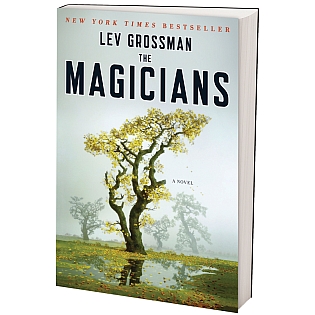 As I’ve mentioned, I’m currently reading Lev Grossman’s latest book, The Magicians. I’m bringing it up again because in the last couple of chapters, I’ve twice come upon adverbs that made me stop reading and start thinking.
As I’ve mentioned, I’m currently reading Lev Grossman’s latest book, The Magicians. I’m bringing it up again because in the last couple of chapters, I’ve twice come upon adverbs that made me stop reading and start thinking.
Here they are in context:
“Penny could be defensive when he was under attack, but he was so autistically focused right now that even direct mockery bounced off him.” (249)
“Penny was nodding and rocking his whole body forward and backward semi-autistically.” (260)
It should be noted that the character Penny is not, in fact, autistic - or, at least, is not identified as such.
I keep re-reading these sentences, because I’m not sure what I think of them - I’m not sure how I feel about “autistically” being used as an adverb to describe something other than autism. I don’t think these adverbs are being used in a way that denigrates the character Penny - Grossman is not using “autistically” to mean “inappropriate” or “inadequate.” In the first sentence, he is simply characterizing the kind of focus one often sees in a person with autism. In the second, he is characterizing a kind of movement. (Though “semi” autistically? I’m not even sure what that means.)
Part of me feels like this is okay - perhaps even good - as it simply conveys the message that acting “autistically” is just one of many ways of acting - not inherently good or inherently bad. Just one of many options.
Another part of me is unsettled by the use of the word in this way, and I’m not even sure why.
I am reminded, though, of Grossman’s earlier book, Codex, in which there was a supporting character who was autistic. He was smart and technologically savvy, and I spent the book waiting for his autism to emerge as a critical plot point. It never did. He just happened to be a character who happened to be autistic.
The character in Codex and the incidental nature of his autism was reassuring to me. But the “autisticallys” in The Magicians are throwing me.
I’m curious to hear what the rest of you think about them.
Comments thread on original post here.
MOM-NOS’s Autism as Adverb was originally published at MOM - Not Otherwise Specified, and appears here under the terms of this Creative Commons License.
related: Should We Label Characters?
related: “Autism” the Word, as Glimpsed in the Wild
Guest on 09/23/10 in featured, Language | 5 Comments | Read More
Comments (5)


I’d say that this usage does not work grammatically, regardless of what political messages it may or may not convey. Some words just can’t be turned into adverbs in the English language. If Grossman had decided to compare Penny’s rocking to that of a Jew at prayer, he wouldn’t have said that Penny was rocking semi-Jewishly. Although this description might not have been meant in a negative way, it’s clunky writing, and his editor should have corrected it.
Mom-NOS,
“Another part of me is unsettled by the use of the word in this way, and I’m not even sure why.”
I cannot say why it would unsettle you, but I would say that it unsettles me because it over-simplifies “autistic” to mean a sub-set of autistic traits that are observable and noticeable to the general population-versus recognizing that being autistic is a complex and holistic state of being. It’s too close to the derogatory way “autistic” is used in France.
Being autistic isn’t about being focused and it isn’t about particular body movements. Those traits can be exhibited by autistic individuals, but it is not what autism is and it’s not what “autism” means.
To me, it seems like a misuse of the word-and “autistically” is not, to my knowledge, even a real word.
I vote to exclude autistically from the language too, just for sheer clunkiness. Language is a fluid thing though, full of words which were not real, until they were. But clunkiness like that also makes me think, once again, that we’ve not yet found the right word in the first place.
Autistically is definitely a clunky, off-sounding word, or non-word as the case may be.
*off-discussion comment*
And I would whole-heartedly agree that we haven’t really found the right word. “Autism” as a DSM-IV diagnosis is a set of observable behaviors/traits. “Autism” as it is experienced by individuals is both more than those behaviors/traits and something other than those behaviors/traits.
Assuming, as I am inclined to do, that the theory of inherent neurological differences is accurate for at least some individuals with autism, there is most likely multiple sets of factors that create those observable traits/behaviors. Some may involve medical issues that can and should be resolved. Others may be-wholly and completely-neurological differences that should be valued and accommodated as part of the human spectrum of being. And some are likely a combination of the two.
Once we can discern those differences-go beyond the readily observable behaviors/traits-we will be able to break what we now call “autism” into even more accurate sub-groups.
But, sadly, words tend to stick, even though the evolve. Autism is not likely to be excised from the public vocabulary, no matter how inaccurate or incomplete we discover it to be.
Title…
[…]although sites we backlink to beneath are considerably not related to ours, we feel they are actually really worth a go via, so possess a look[…]…